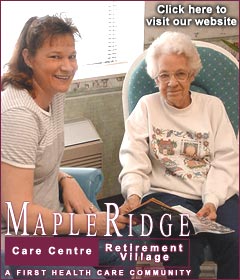|
This guy really knows how to grab
attention and how long he can hold it for, especially amongst young
people. They hung on his every word, as unbeknownst to them, the
high-energy guest speaker swept their thoughts and cleaned their
thinking.
Sroka led the 900-plus LCHS voices
chanting Thursdayís message:
My body
My choice
I am the power of one
He craftily picked them up using
tried-and-true Madison Avenue strategies and pop culture messages
and then deftly led them through the true realities using facts,
examples and statistics on sex, drugs, alcohol and violence. Using
an overhead projector and transparencies, he rapidly fired visual
images, slowing down to gather the studentsí thoughts and then
speeding up as appropriate to lead them through less-than-pleasant
real-life issues, ultimately leading them to healthier thinking.

[Photos by Jan Youngquist]
With the grace of a master, he grasps
their minds and enters their hearts by telling stories and using
humor. Recalling the story of a haughty young man wearing expensive,
name-brand tennis shoes, he points out that "the power of you"
is not the [brand] name on your butt or chest. Buy some reasonably
priced shoes and put the price difference in a college fund where it
will make a difference in who you are and will become. "Learn
something, be something," he says.
Using the lyrics of sexually charged
popular songs, he starts the lines, and in unison students finish
them. In the last song he says, "Itís getting hot in here." "So take
off all your clothes?" they respond.
Now theyíre in the moment, and he runs
sexually transmitted disease facts past them. It isnít pretty.
Eighty percent of the population has herpes. One-fifth of all teens
are stuck with the lifelong disease. Forty-six percent of the girls
get genital warts. He gives statistics that are teen-specific, not
general population.

Thereís no dodging truth about sex and
its consequences. He makes it clear that oral sex is definitely sex
and it carries all the disease dangers of intercourse. In fact there
is no safe sex. A condom will not protect your real sex organ, the
one between your ears: the brain. It wonít protect your reputation,
and most importantly it wonít protect your heart.
The effects of drugs, alcohol,
violence, sex and addictions are addressed, supported with facts and
illustrated with familiar examples. He polls the students, and with
not the slightest hesitation, they raise their hands high. Yes, many
have seen the family member that used to be funny after a couple
beers and a few years later has become belligerent after a couple.
He asks, "Who knows someone in this room that has had sex?" The
auditorium is instantly filled with raised arms.

He interweaves stories and pictures of
people, some first-time users of any substance ó inhalants, ecstasy,
meth, crank, heroine, steroids and over-the-counter stimulants. As
we all know now, some canít take them. They can cause heart attacks.
Early alcohol use leads to alcoholism,
potential rape and violence within relationships.
[to top of second column in
this article]
|

Last year 1,800 youth committed
suicide. One in 10 teens made suicide plans last year. The acronym
"SUICIDE" acts as a guideline for friends to be aware of when
someone may be in trouble.
Substance
abuse
Undergoing
a loss
Isolation
Change
in behavior
Ideas
of suicide: If someone says they feel suicidal, do not dismiss it.
Get them to help immediately.
Depression:
They are acting sad.
Education:
Be aware of the signs.
The national suicide hot line is 1
(800) SUICIDE.
Important
life skills:
Canít do
drugs
If you see someone doing drugs, alcohol
or violence, recognize these are all cries for help.
Get
involved
Whether it is in sports, clubs,
hobbies, art or bands, do things.
Call on a
higher power
As in "see you at the pole." Practice a
faith.
Practice
stress relievers
Such as deep-breathing exercise with a
steady pursed lip; release like youíre blowing bubbles.
Lighten
up
Have a little fun from time to time.
"Who lives in a pineapple under the
sea?" Sroka asks. And the kids all replied, "Sponge Bob Square
Pants."
This is from a TV cartoon, for those of
you who might be a little behind the times.
Think
first
Practice conflict management.
Sroka says that if weíre going to make
it as a society, weíre going to have to stop the hate.
Another chant breaks forth in cadence:
Stop the violence
pump up the peace
Knowledge and love
for you and me
Sroka left the students with a final
message to have awareness and sensitivity toward one another,
especially when parting. You always want to be conscious of your
words, as they could be the last that are spoken between you.
He showed them the strength that each
and every one has to make healthy choices. Showed them that they
hold the power to influence some one else. And drove home the
message that you should always tell people you love them before
parting.

Following
his presentation students flocked around him to speak. They liked
what he had to say. A group of boys all said, "Ya, I liked his
presentation. He was good." They all thought they didnít really hear
anything new, but a couple liked the new perspective he brought to
some of the issues. Another said, "I liked the statistics,
especially the percentages." They put new meaning on things for him.
[Jan
Youngquist]

|
|
The father of three girls and a retired
teacher from Cleveland Public Schools, Sroka has been a national and
world leader in health education. As a visionary he has paved the
way, writing about current health issues with todayís youth, and has
spoken all over the nation. He has been called to consult in
communities as both a preventative measure and to those in the
recovery process.
He was inducted into the National
Teachers Hall of Fame in 1996. He continues to teach at the School
of Medicine, Center for Adolescent Health at Case Western Reserve
University and Cleveland State University. He also serves as
president of Health Education Consultants.

[Photo by Jan Youngquist]
[The Healthy Communities Partnership; Alcohol,
Tobacco, and Other Drugs Task Force; Lincoln Community High School;
Lincoln Police Department; and Dick Logan worked together in
bringing Sroka to town.]
At the noon-hour community gathering
Sroka shared perceptions of the LCHS student body and the responses
he got from students following his talk. He said, "You walk into
LCHS, and you feel respect in the building. The kids are
well-behaved, and the teachers have discipline." He liked how
teachers sat with students in the auditorium.
He was mobbed by kids following his
talk. They told him they liked what he had to say. Some had tears in
their eyes. He handed out about 50 cards with his name and e-mail
address on them and expects he will hear some serious messages from
some of the students

LCHS vice principal Todd Poelker said
students and teachers liked the presentation at the assembly.
Students said they liked the facts they got in short amount of time
and he was entertaining. The most common response was about facts
and stats on sexually transmitted diseases. Some were shocked at
what is out there. They said they didnít realize all of it.
[to top of second column in
this article]
|

Sroka doesnít hold back, much,
in his talks. What he does hold back is only because adults usually
have concerns about it. The kids want more. He grabs their thoughts,
using the newest teaching and learning technique, brain-based
thinking. He meets them where they are and then gives them the
facts. You have to reach their hearts and then show them they have
choices, he says. Kids need options.
He recommends building up clubs.
One-third of the kids are going to choose right. One-third will
choose wrong. It is the other one-third that sit on the boundary
that can be reached if you offer them something to do.
One thing he wants to emphasize it that
it is not up to the law enforcement or the schools to handle youth
issues by themselves. It takes "total community immersion," all
community agencies and families, every one working together on all
sides of our youth.
He advises that when dealing with
youth, "Treat them with the respect that you want to be treated
with." And he encouraged, "Go out and do the best you can, every day
you can." They will remember you all the rest of their lives if you
make them feel special. "Itís not what you tell someone, itís how
you make them feel that does not change."
There were
about 30 in attendance at the noon meeting, including Lincoln mayor
Beth Davis, Logan County Board chairman Dick Logan, Lincoln DARE
officer Tim Butterfield, LCHS and LJHS administrators, Logan/Mason
Mental Health Department, Logan County Health Department, Healthy
Communities Partnership and others. The general consensus was that
everyone would have liked more time to do more things with Sroka.
Particularly having time for interaction and brainstorming. Kristi
Lesson, prevention specialist at Logan-Mason Mental Health, said,
"We hope to have him return for an open community forum." The public
will be invited.
[Jan
Youngquist]
|